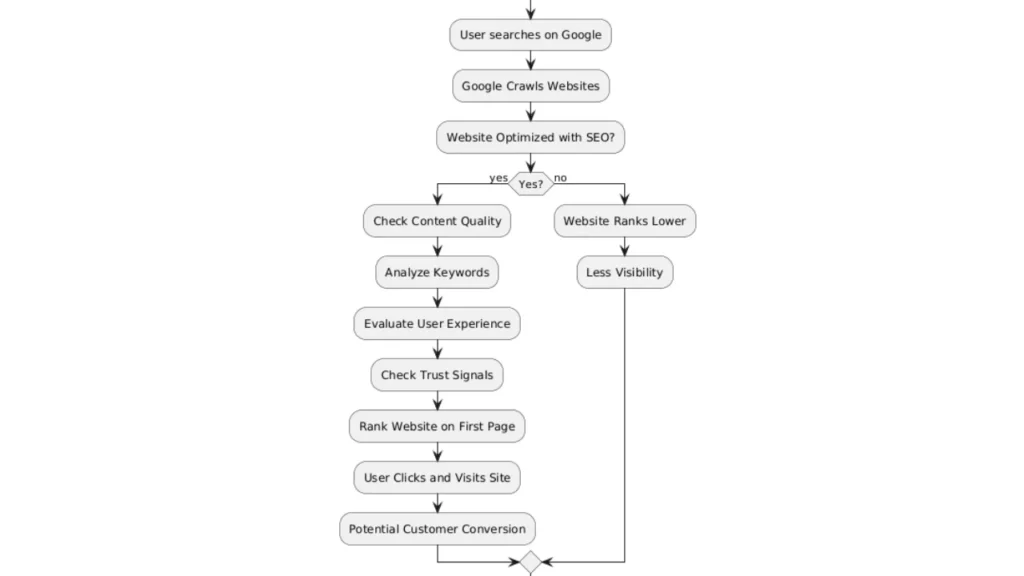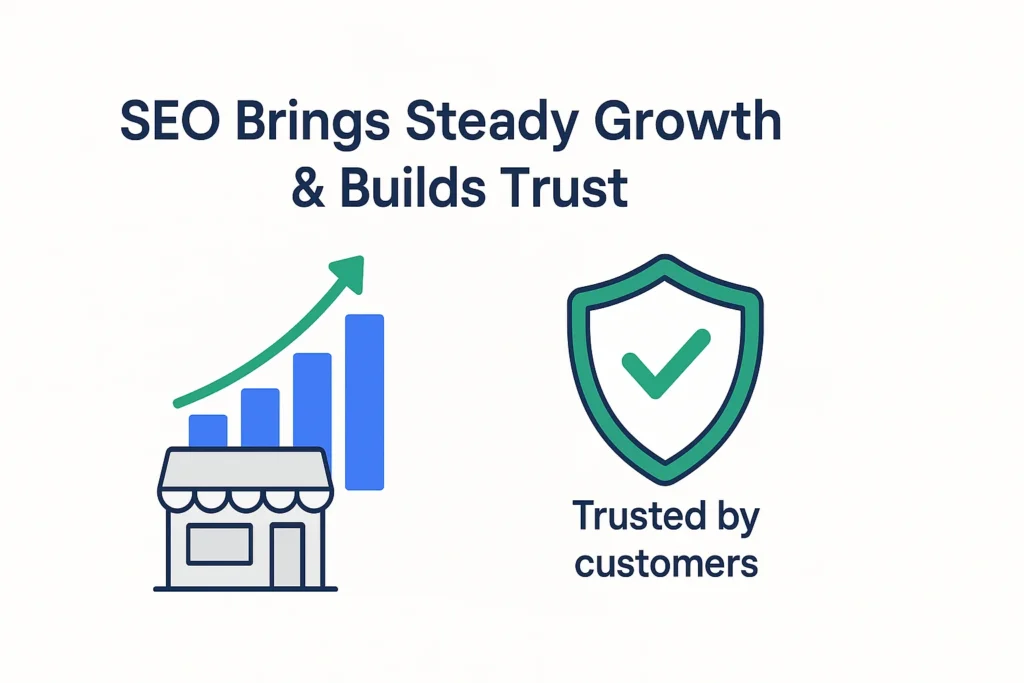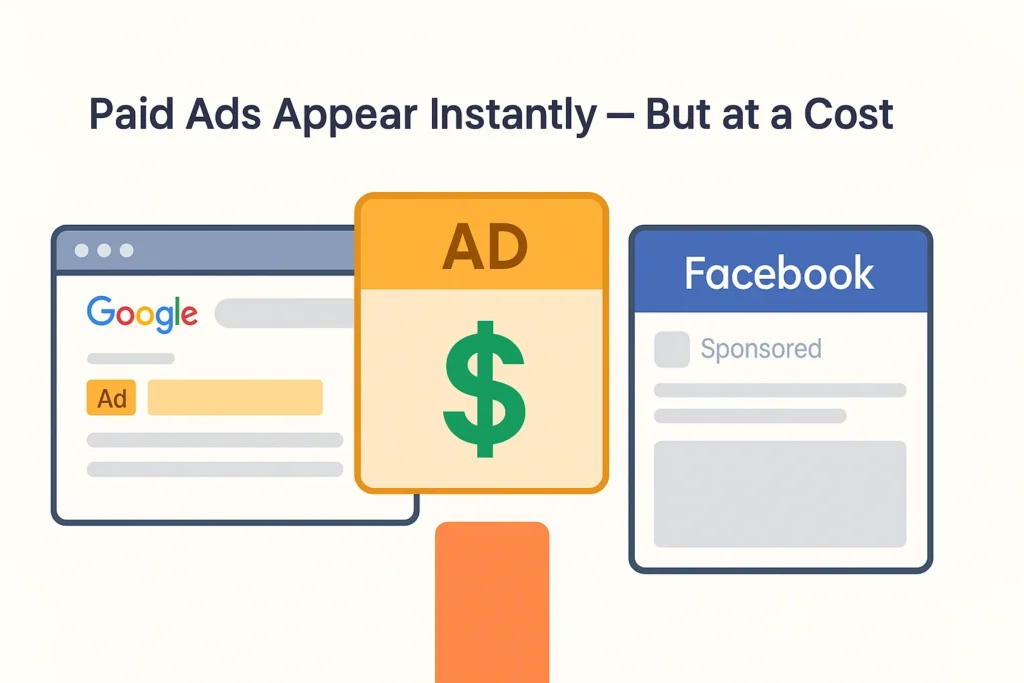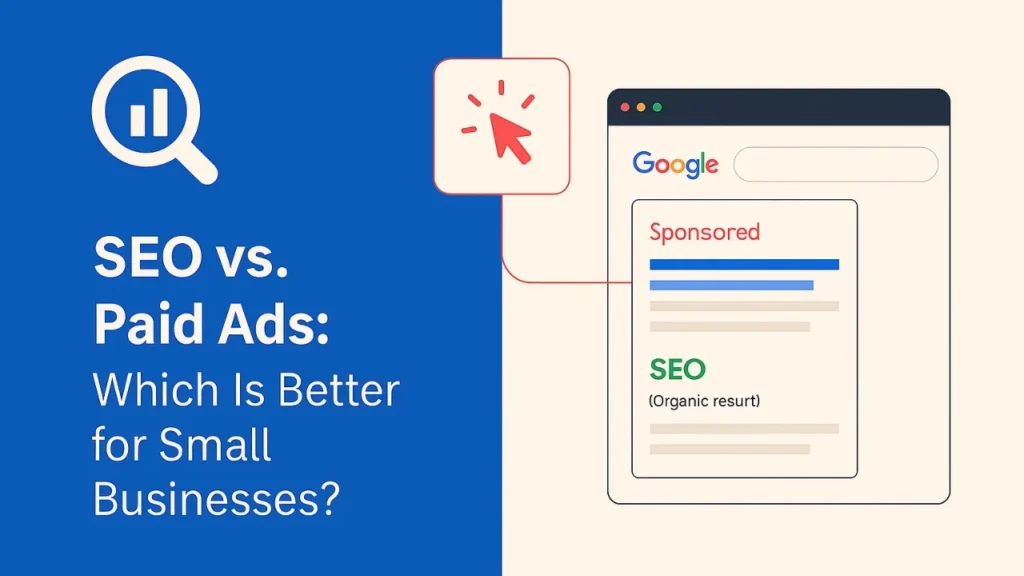Table of Contents
ToggleIntroduction
Trying to decide between SEO vs Paid Ads can feel like standing at a crossroads. On one side, you’ve got a strategy that promises long-term, steady growth. On the other hand, a speedier route to prominence can quickly become costly. As a small business owner, how do you choose the one that actually works for your goals, your timeline, and your budget?
This article is here to help you figure that out—with no fluff, no confusing jargon, and no pressure. Whether you’re running a brand-new online shop or offering local services in your city, the choice between organic search traffic and paid advertising strategies is one of the most important decisions you’ll make in digital marketing.
Let me share something personal with you. A while ago, someone close to me started a small baking business from her kitchen. She put in late nights, tested recipes endlessly, and poured her heart into her work. But after months of effort, her website was still quiet—no visitors, no orders. One evening, she looked at me and asked, “Should I try SEO or run Facebook Ads?” That question stuck with me. It’s the same one I hear from so many small business owners who are doing everything right but still feel invisible online.
You’re not alone if you’re feeling that way right now—high expectations, little money, and pressure to see results quickly.
Here’s what you’ll learn in this guide:
- The real difference between SEO vs Paid Ads
- How each option impacts your business emotionally and financially
- Which one fits your current goals and stage of growth
- Real-life examples that bring clarity
- A comprehensive guide to assist you in selecting the best option for your company
Take a deep breath. You’ve already taken the first step by searching for answers. Now, let’s walk through this together, just like a conversation with a friend who wants to see your business succeed.
What is SEO? (Search Engine Optimization)
Think of SEO as your silent business partner, always working behind the scenes, day and night, to bring the right people to your website. The technique of making your website show up organically on search engines like Google when someone looks for the goods or services you provide is known as SEO, or search engine optimization. You’re not paying for every click or launching expensive ads. Instead, your site earns its spot by providing genuine value, relevance, and trust.
Now, picture this: someone types “affordable home cleaning services near me” into Google. If your website is optimized properly, it can appear on the first page. That kind of visibility can lead to real customers, even while you sleep. There’s no need for constant boosting or bidding—just steady, consistent work that brings long-term results.
Behind-the-scenes activities are equally significant. Search engines follow a series of steps to decide which websites to show. They crawl your website, comprehend your content, and assess its value by looking at user experience, quality, keywords, and trust signals. When your website checks all the right boxes, search engines are more likely to show it to the right people at the right time.
And the best part? SEO isn’t about gaming the system. It’s about honestly helping people find exactly what they’re already looking for—you. It ensures your business appears when it matters most—when someone is ready to take action.
Whether you’re new to business or juggling everything on your own, SEO gives you a fair chance to compete, grow, and build a strong online presence without stretching your budget.
Want to dive deeper? This in-depth guide breaks down how SEO can help you attract more customers without spending a fortune.

Benefits of SEO for Small Businesses
SEO can feel a bit slow in the beginning, especially when you’re eager to see results. But if you’re willing to be patient, the rewards are long-lasting and deeply satisfying. One of the most valuable benefits of SEO is that it helps bring in steady, reliable traffic to your website, without you needing to constantly pay for it. Once your site earns a good spot in search results, it keeps working for you, day and night.
It also builds real trust. People tend to trust websites that appear naturally in search results because they believe those businesses have earned their spot. This trust plays a huge role in how people see your brand, especially when you’re new or competing with bigger names. Over time, that trust grows into brand authority—and that’s something no ad can buy.
And the best part? SEO doesn’t just bring any visitors—it brings the right ones. These are people already searching for exactly what you offer, which makes them much more likely to become customers. That makes SEO one of the most cost-effective and meaningful ways to grow your business, especially when every dollar counts. To ensure your website is fully optimized, check our on-page SEO checklist.

Why SEO Is So Powerful for Small Businesses
Consistent Traffic That Doesn’t Stop
Unlike paid ads that disappear when your budget runs out, SEO helps your site attract visitors every day without ongoing costs. It’s similar to having a 24/7 online storefront.
Organic Rankings Build Trust
An organic search engine ranking indicates that your company is reliable, current, and well-established. Ads have a far lower click-through rate than organic results.
Builds Strong Brand Authority
With time, consistent SEO efforts position your brand as a credible source in your industry. Your content starts getting noticed, shared, and respected.
Local SEO Brings Nearby Customers to You
If you’re running a local business, SEO is your best friend. By optimizing for local search terms and using tools like Google Business Profile, you can show up when people nearby are searching for your services.
Take your local SEO to the next level with our step-by-step guide: Proven Local SEO Strategies for Small Businesses
If you’re using WordPress, Rank Math is a great tool that makes SEO much easier, even if you’re not a tech expert. It helps you optimize your content by checking keywords, improving readability, suggesting internal links, and guiding you on writing effective meta titles and descriptions. Its user-friendly dashboard gives real-time tips that simplify SEO, making it easy for beginners to follow and apply.
Using Rank Math feels like having a smart assistant by your side. It not only improves your content but also helps you understand what search engines and your audience truly care about.
Just like growing a tree, SEO takes time and care. But once it starts to grow, it keeps giving back. For small businesses working with tight budgets and big dreams, that kind of steady growth can be a game-changer.
Downsides of SEO You Should Know
Even though SEO can bring long-term growth, it’s important to understand its limitations, especially if you’re a small business owner juggling everything on your own.
1. SEO Takes Time and Patience
One of the biggest drawbacks is how slow results can be. You may publish great content, optimize your site, and follow all the right steps, but nothing happens right away. Weeks or even months can pass before you see a shift in traffic. That delay can be disheartening, especially when you’re eager to grow or facing financial pressure.
2. Constantly Changing Algorithms
Google and other search engines alter their ranking algorithms on a regular basis. It might not work today what worked last month. These changes can throw off your strategy and leave you feeling stuck or confused, particularly if you’re not familiar with technical SEO.
3. It’s Not Entirely Free
While you’re not paying for clicks like in ads, SEO still comes with costs. You may need tools, plugins, freelancers, or even SEO audits to keep things running smoothly. For many small businesses, those hidden costs can add up over time.
4. Emotional Toll of Uncertainty
You put in hours of work—writing, editing, optimizing—only to find your website stuck on page three. That can be deeply frustrating. SEO requires emotional resilience, trust in the process, and a commitment to keep going even when results are slow. To avoid pitfalls, check out fix common SEO mistakes.
What are Paid Ads?
Paid ads, like Google Ads or Facebook Ads, are like digital billboards. You pay to appear right where your customers are hanging out—on search engines, Instagram, YouTube, etc.

Benefits of Paid Advertising
1. Instant Visibility When You Need It Most
Paid advertising gives your business the power to be seen right away. From the moment your ad goes live, you can start receiving clicks and visits—perfect for time-sensitive campaigns, product launches, or when you just can’t afford to wait.
2. Great for Testing Offers and Ideas
Not sure which headline, image, or offer will connect with your audience? Paid ads let you test quickly and get real data fast. You can tweak, adjust, and learn what works best, without long delays.
3. Precision Targeting with Smart Tools
Platforms like Google Ads and Meta Business Suite give you full control over who sees your message. Reach people by location, interests, behavior, age, and more. It’s like delivering your offer directly to the right inbox at the perfect moment.
Downsides of Paid Advertising
1. Traffic stops when the budget runs out
One of the biggest downsides of paid advertising is that it only works while you’re paying for it. As soon as you pause your campaigns, the traffic disappears. Unlike SEO, there’s no lasting impact. It’s like flipping off a switch—everything goes dark.
2. High costs, low returns
Paid ads can be expensive, especially for small businesses trying to compete in crowded spaces. You may spend a significant amount just to test what works. And if you don’t get the results you hoped for, it’s money lost that you can’t get back.
3. It demands time and constant monitoring
Running ads isn’t just “set and forget.” You need to watch performance, tweak headlines, adjust targeting, and update bids. It can feel like managing a second job, especially if you’re already wearing all the hats in your business.
4. Emotional stress and uncertainty
The emotional toll of paid ads is often overlooked. There’s pressure to see instant results, and when things don’t work out, it’s easy to feel defeated. That uncertainty—wondering if your money is being wasted—can weigh heavily on any business owner.
5. Not a long-term growth solution
While ads can bring short bursts of traffic, they don’t build brand strength or long-term visibility. When the campaign is over, your reach is also over. For lasting impact, you need something more sustainable.
Which One Should You Choose?
This depends on your goals:
H3: Choose SEO if:
- You want long-term, consistent growth
- You have a limited marketing budget
- You’re building a local or niche brand
- Instead of renting your traffic, you want to own it
H3: Choose Paid Ads if:
- You’re running a limited-time offer
- You want fast results
- You’re launching a new product
- You can spend money on ongoing optimization and testing
Pro Tip: The best strategy often involves both SEO and paid advertising, especially if you’re trying to scale. Start with PPC to gain quick visibility, and build SEO in parallel for sustainable results.
Real-Life Example
Let’s say you run a small online boutique. You want to build your brand and increase revenue.
- You launch a Google Ads campaign targeting “buy handmade jewelry online.” You start getting visitors and a few orders, but each sale costs you $10 in ad spend.
- At the same time, you optimize your website using tools like Rank Math, set up a Google Business Profile, and publish helpful blog content using keywords from Google Search Console.
- After a few months, your pages start showing up on the search engine results page (SERP), and customers begin finding you organically, without paying for every click.
That’s the beauty of combining short-term paid advertising with long-term SEO growth.
The Emotional Side – How It Feels
Running paid ads can feel exciting—you see instant results. But it can also cause stress if you’re constantly monitoring your advertising budget.
SEO feels slower. It takes patience, effort, and consistency—but the reward is deep satisfaction. It’s like watching your business build real roots online.
Both have emotional highs and lows. All you have to do is choose the course that aligns with your timetable, finances, and energy level.
Which One is Better for Small Businesses?
The reality for small business owners is that there isn’t a single solution that works for everyone. SEO and paid ads both bring unique value, but it depends on where you are in your journey. If you’re just starting out and need quick sales to stay afloat, paid advertising gives you the boost to get noticed fast. But if you’re building something for the long haul—a brand that stands strong in your local market or niche—then SEO becomes your most loyal ally.
Although it might take some time, it builds credibility, generates steady traffic, and endures when the funding expires. The best choice? Often, it’s a balance of both—fast results from ads, lasting impact from SEO.
Conclusion: Your Smartest Move Starts Here
Whether you go for SEO, Paid Ads, or both, the key is to be strategic, patient, and data-driven. If you’re looking for expert help tailored to your small business, check out our SEO services for small businesses and see how we can support your growth journey.
To measure, tweak, and expand, use tools such as Google Analytics, SEMrush, and Google Search Console.
Additionally, keep in mind that every click, search, and client matters.
Let’s Grow Your Business Together – Trust GlobalRankWeb
At GlobalRankWeb, we specialize in helping small businesses thrive online with SEO strategies tailored just for you. Whether you want to rank on Google, build brand authority, or run PPC campaigns that convert, we’ve got your back.
100% personalized service
Affordable pricing for startups
Transparent reports & friendly support
Let’s build your online presence—together.
Get your free consultation today and let’s find the perfect strategy for your business.
Frequently Asked Questions (FAQs)
1. Does SEO make sense for a small firm on a limited budget?
Of course. Although it takes time, SEO is one of the most economical ways to expand your company’s internet presence. Instead of paying for every single click, you’re investing in content and strategies that keep working long after they’re published. Even with a modest budget, SEO may help you establish long-term visibility and credibility if you’re persistent and patient.
2. Can I run paid ads and work on SEO at the same time?
Yes—and in fact, that’s often the smartest move. Paid ads give you quick visibility, while SEO builds your long-term foundation. You can use paid campaigns to test what keywords or offers perform well, then use that insight to guide your SEO strategy. It’s like planting seeds while also watering the garden.
3. How do I know which strategy is working better for my business?
Start by tracking the right metrics. Use tools like Google Analytics and Search Console to monitor SEO performance and track conversions and click-through rates for paid ads. But also trust your gut—if SEO is bringing in steady leads over time, or your paid ads are giving you a strong return quickly, you’ll feel the difference in your business growth. The numbers tell part of the story; how your business feels day-to-day tells the rest.







